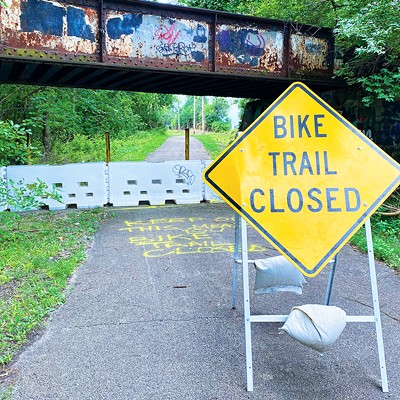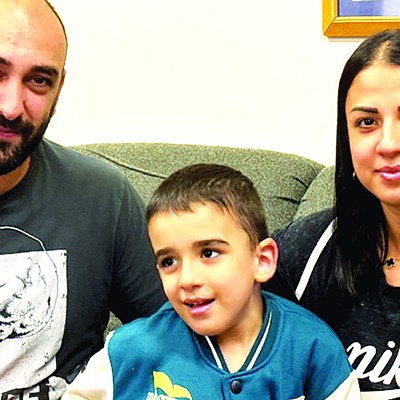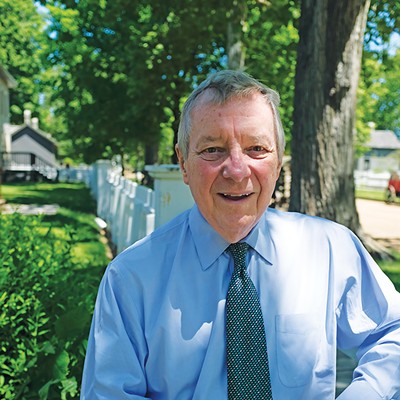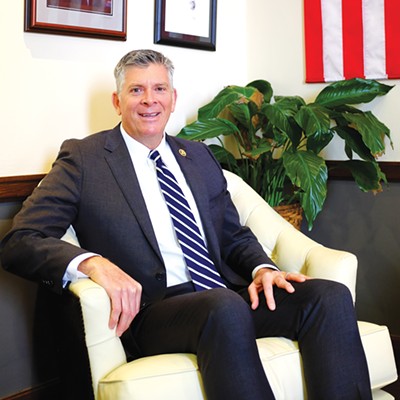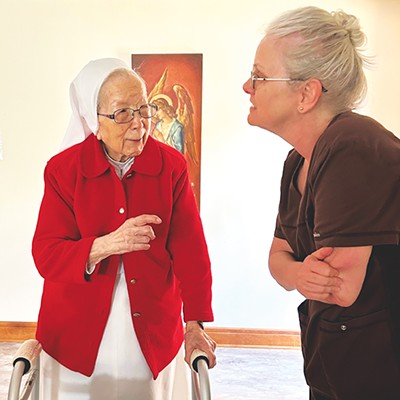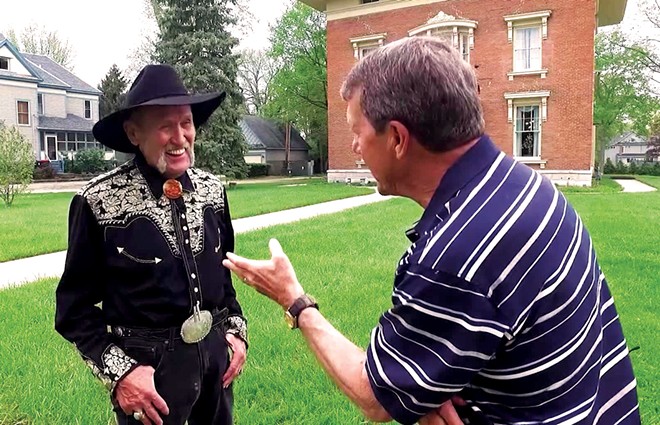
Mark McDonald's greatest professional reward is knowing that people enjoy the product he produces.
"When I go to the grocery store and people say 'I love your show,'" McDonald said, "that makes it all worthwhile. I love that."
McDonald has been the only host of the Public Television series "Illinois Stories" since its inception 19 years ago. He and his two camera crews, who have also been with the show since the beginning, have amassed 1,240 episodes that take viewers into both known and unknown central Illinois locations.
Each half-hour "Illinois Stories" program is devoted to a single topic and gives viewers a better understanding of the region's fascinating people and places. The program has won an Emmy Award and numerous other accolades. Many people make pledges during public television fundraising drives just to keep "Illinois Stories" on the air.
It was therefore a shock when McDonald was recently informed that production of the show, and his employment, will end on June 30.
"To build an audience over 19 years, doing a local program that doesn't exist anywhere else, then just to cold turkey quit, doesn't make sense to me," McDonald said. "All of this momentum we had going, then just to give it up, seems like a big mistake."
WSIU Public Broadcasting, which now owns the rights to "Illinois Stories," had this to say about the show's being canceled.
"WSIU recently developed a common schedule and in doing so did a comprehensive audit of the programming," said Jim Potter, executive director of University Communications and Marketing at Southern Illinois University Carbondale, the network's host institution. "At that time the decision was made to end new production of episodes of 'Illinois Stories' and rely on the bank of existing content as they look toward developing a new slate of programming in November."
WSIU Executive Director Fred Martino added, "We are going to continue to run 'Illinois Stories.' There are currently new ones being produced through the end of June and there will continue to be archived material that will air."
WSIU acquired Springfield-based Network Knowledge, the originator and longtime producer of "Illinois Stories," in late 2018. Network Knowledge included TV stations WSEC in Springfield, WMEC in Macomb and WQEC in Quincy, and its board members were assured that "Illinois Stories" would continue after the merger.
"I told them very explicitly that if you want to stay connected to this part of your viewing area, you've got to keep Mark McDonald on staff doing 'Illinois Stories,'" said Keith Bradbury of Jacksonville, a longtime Network Knowledge board member. "Mark is the one that everybody knows and loves, he's their connection to public television, which is so important for a company that relies on donations. And they said they agreed, 'Oh yeah, we're keeping Mark.'"
But they aren't keeping McDonald.
"I was told on a Zoom call that they weren't going to do 'Illinois Stories' any more and by June 30 I would be terminated," McDonald said. "It was a shock. This whole thing has been clumsy, and nobody wanted it this way."
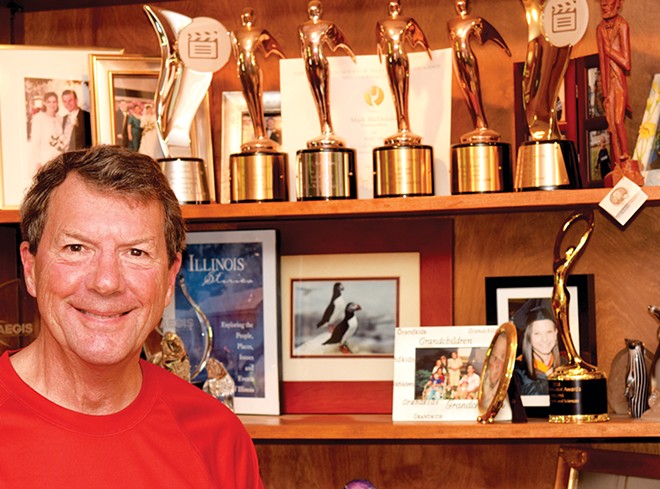
"I had no experience. None."
Mark McDonald grew up in St. Louis and could not figure out what he wanted to do after college until he decided to try radio broadcasting. While McDonald was enrolled at the Broadcast Center in St. Louis, one of his teachers, a St. Louis television anchorman, asked him to give TV broadcasting a try.
McDonald made a tape, sent it out, and a week later was hired by a station in Ada, Oklahoma, one of the smallest television markets in the country.
"I had no experience. None. I had never done an interview, I had never been on camera except in school," McDonald said. "I showed up for work on Monday morning to do my first shift and nobody was there, I couldn't even get in."
McDonald was able to get the attention of an overnight FM radio station DJ who let him in the building.
"I didn't know where my desk was, where the wire service was, I didn't even know where the bathroom was," McDonald said. "The engineer came in and told me we were on in about 45 minutes. I quickly typed up something, he turned the lights and camera on, I read what I had typed, he turned the lights off, and it was over."
McDonald worked his way up from the morning news show in Ada to anchoring the 6 and 10 p.m. newscasts. A year and a half later he took a news anchor job in Fort Smith, Arkansas, then moved to a Springfield, Missouri, TV station before being hired to anchor the news at WICS-TV in Springfield, Illinois.
McDonald worked at WICS for five years before being unceremoniously fired one day without warning.
"The station news director called me in and said, 'Get your stuff together, you're not working here any more,'" McDonald said. "None of it made a lot of sense. I think it was office politics. But I'm over it, I forgive them, it's all worked out for the better."
McDonald next went to work as the public information officer for the Illinois State Police, then a brief stint at the Prairie Heart Institute in Springfield, before being introduced to the WSEC-TV president, Jerry Gruebel. McDonald did volunteer work for WSEC, the local public TV station, and hosted a monthly interview program called "Lawmakers with Mark McDonald."
WSEC owned the rights to the "Illinois Stories" name but the program at the time consisted of sending a camera to public hearings or seminars and simply airing the footage with no narration, interviews or editing.
"That kind of stuff is just not watchable for most people," McDonald said. "So I would go to Jerry and say, 'Hey, I've got a story idea,' and he'd say, 'Yeah, I'll buy that.'"
McDonald did more on-camera work and was paid by the story until Gruebel decided to put him on staff and revamp "Illinois Stories" in 2003.
"We started doing tours of places and meeting interesting people, and that is what 'Illinois Stories' became," McDonald said. "It was much more watchable and a lot more people really liked it."
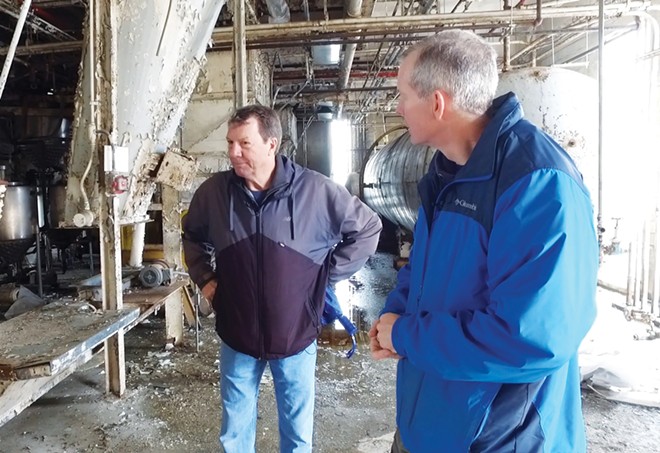
"Places where human beings don't typically get to go."
McDonald developed a routine where he would talk to the "Illinois Stories" interviewees by phone before showing up with a camera crew, which put the subjects at ease and helped McDonald and his crew get a much better idea of how the shoot would proceed. Still, some people required a bit more work in order to generate a good interview for the show.
"Sometimes folks will get into a mode of one-word answers. 'Sir, tell us about your wonderful building, this beautiful historic place,' and they might say, 'Oh, not much to tell,'" said Randy Phillips, a cameraman from Quincy who has been with "Illinois Stories" since day one. "And that's when Mark really shines, he draws them out. We have to fill 28 and a half minutes, so he earns his money on those days."
Phillips' most memorable "Illinois Stories" program centered around changing the massive river control doors on the Mississippi River Lock and Dam at Keokuk, Iowa.
"We got to go into places where human beings don't typically get to go and see things that haven't been seen for many years," Phillips said. "We could actually see the bedrock the whole structure sits on."
Springfield-based cameraman Tony Yuscius, who has also been with "Illinois Stories" for 19 years, remembers going into nonpublic areas of numerous courthouses for the show.
"We would ultimately end up in the bell tower. We climbed every rickety ladder amid bird droppings and everything else you would find there, and we would have this view of the county," Yuscius said. "And it would be the hottest day of the summer or the coldest day of the winter. We would end up in a bell tower every single time. We could have killed Mark," he chuckled.
McDonald fondly remembers a story about a Rushville man who rescued a Quincy theater organ and had it moved to his home, where he built an addition to accommodate it. McDonald noted that "Illinois Stories" has featured Jacksonville 58 times, including a story about an Illinois College student who created a biodiesel plant in his garage and used the end product to power his car.
"Illinois Stories" won a regional Emmy Award in 2006 for one of McDonald's favorite programs, about a group of early-1800s fur-trapping reenactors in Beardstown.
"These guys are characters. They have a place on the Illinois River called Scab Hollow," McDonald said. "They go out there once a year, put up their tepees, tan hides and throw hatchets, they do this whole frontier deal. And they invite the public out there to do it with them."
The "Illinois Stories" viewing area, and the territory from which its stories are derived, spans about one-third of the state from the southeast Iowa and northeast Missouri borders, south to Litchfield, east to Champaign and north to Watseka. That means McDonald is recognized in many of the places he goes.
"I went to the eye doctor this morning, and in the waiting area this lady says, 'Hi Mark.' I had never seen her before in my life," McDonald said. "The nice thing about doing 'Illinois Stories' is that people don't look at me like I'm a star, they feel like I'm their friend."
"We're going to miss that a lot."
McDonald had an inkling that something was going to happen to "Illinois Stories" after the show was moved from its longtime weekday evening and Sunday time slots.
"They wanted this two-hour block to run BBC news programs and I asked why, because people can get international news anywhere, all the time," McDonald said. "I kind of knew when they took 'Illinois Stories' out of that slot that something was up."
The 72-year-old McDonald had been encouraging network executives to hire a younger person whom he could train to carry on with "Illinois Stories" after his eventual retirement.
"What you want doesn't always matter, but I should have been able to bring on a younger person and orient them to do this," McDonald said. "I want 'Illinois Stories' to continue."
Cameraman Phillips also would have liked the show to continue.
"It's a shame because there are a lot more stories to tell and there always will be," Phillips said. "When I tell people that I do the show 'Illinois Stories,' I only get two answers. Ninety-five times out of a hundred the answer I get is, 'Oh my God, I love that show, I never miss it.'''
"Nineteen years is a heck of a run. Most shows don't make it anywhere near that long," Phillips said. "And for it to be the same host and crew, that's a really unique thing too."
Cameraman Yuscius said abruptly ending the show does a disservice to the viewers.
"Usually there's a big finish, or a way to let the public know that this is ending and you'd have some big sendoff," Yuscius said. "This has always been one of the top-rated shows on the local network, so I was shocked that they decided to pull it. I think there is still a great amount of public support."
Former board member Bradbury agreed that public support continues for "Illinois Stories," and ending the show may have repercussions for the network.
"I was on the air with Mark doing pledging probably two dozen times. That's about the easiest job you'll ever have in your life because Mark makes you talk, he is the king of the interviewers," Bradbury said. "We would raise a lot of money. We raised $11,000 in one night, which was phenomenal."
"So many of the places that he took us to, we would never have known that they were there," Bradbury said. "Some of those best-kept secrets were revealed by Mark taking a camera crew there and telling us about them. We're going to miss that a lot."
McDonald is still filming new "Illinois Stories" episodes through the end of June. A few years ago he and his wife, Pam, purchased a lake house in Arkansas, where they expect to spend a little more time after the show ends. McDonald's next goal is to find something worthwhile to do for the people of central Illinois.
"I hope the viewers had as much fun as I did. It's been a terrific experience," McDonald said. "I just hope that the viewers don't miss it too much. I don't want them to feel bad.
"I have been given an opportunity to know all of these communities, big and small, that nobody else gets," McDonald said. "It's been a great privilege."
And if it were ever filmed, what would an "Illinois Stories" episode centered on Mark McDonald's career be titled?
"A lady asked me once in a shoot, 'Is there anybody you can't talk to?'" McDonald said. "I think that would be a good title."




